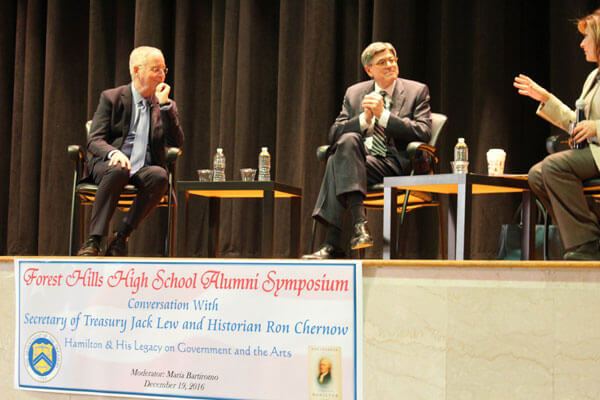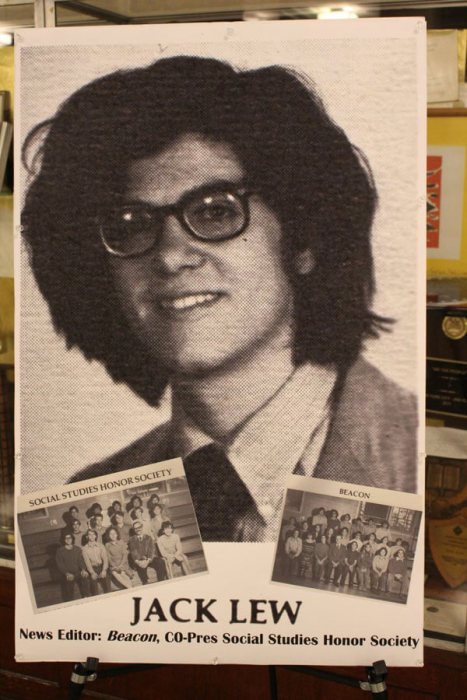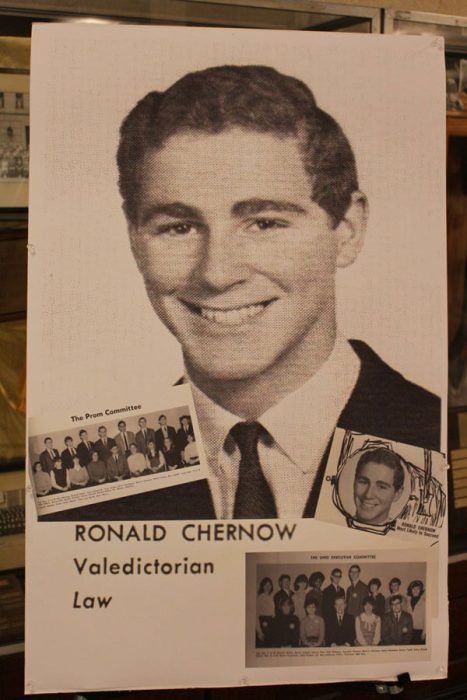By Bill Egbert
Two illustrious alumni returned to Forest Hills High School last week to talk history, economics, achievement and hip-hop.
U.S. Treasury Secretary Jacob Lew, Class of ‘72, and Pulitzer Prize-winning author Ron Chernow, Class of ‘66, came back to their alma mater at 67-01 110th St. in Forest Hills Dec. 19 for an “Alumni Symposium” in a conversation moderated by financial journalist Maria Bartiromo, a host on the Fox Business News channel (though not herself a FHHS alum).
Lew and Chernow were an apt pairing, because they share another connection beyond the school: Lew is best known as the current secretary of the Treasury and Chernow gained acclaim for his biography of the nation’s first Treasury secretary, “Alexander Hamilton,” which inspired the hit Broadway musical.
In fact, the two first discovered they both went to Forest Hills High School the night Lew attended a showing of “Hamilton” and met Chernow, who serves as historical consultant for the show, backstage.
Both men marveled at Hamilton’s career – in particular, the fact that in the earliest years of the new nation, the Treasury secretary’s role overseeing the customs service and the Coast Guard meant that Hamilton was in charge of 90 percent of the federal government.
And Chernow pointed out why it shouldn’t surprise anyone that the complicated story of Hamilton’s life would be set to a hip-hop score.
“Hip hop has more words per beat than any other genre of music,” he said, “so it’s perfect for complex ideas.”
Obviously one topic sure to come up was Lew’s controversial suggestion in 2015 that Hamilton might be removed from the $10 bill as part of a larger initiative to include women and minorities on U.S. currency, but Lew denied there was ever a solid plan to oust the newly fashionable Founding Father from the tenner.
“It was actually never the case that we were going to take Alexander Hamilton off the $10 bill,” Lew said. “The question was how do we expand the U.S. currency to include additional images and faces.”
Though Hamilton will remain, women will still be represented on the new 10-spot due to enter circulation in 2020, according to Lew, but on the back of the bill, which currently features a staid image of the U.S. Treasury building. Lew pointed out that as one of the first institutional buildings representing the government of the young republic, the U.S. Treasury building was the site of most early protests, so the reverse side of the new $10 bill will sport a much livelier image of the building beset by a protest by early suffragettes.
During the Q&A period at the end of the conversation, many of the students’ questions involved how the two accomplished alumni had chosen their paths and achieved their goals.
Both confided that neither ultimately pursued the career goals they had set for themselves before graduating from Forest Hills.
Lew had originally wanted to be a journalist, and even served as the news editor of the school paper, The Beacon.
“I actually thought I was going to be a journalist,” Lew said, “and I went to Washington, and I ended up getting a job working for a member of Congress, and I really enjoyed the work.”
Eventually he decided that public service was where he could make the most difference.
“There is no avenue of work where you can have as much of an impact on people’s lives as in the public arena,” he said.
Chernow had already started focusing on becoming a lawyer by the time he graduated from high school – mostly, he said, because he thought he needed some “practical” way to make a living.
“But what I’ve discovered in the years since,” he said, “is that doing the ‘practical thing,’ if you don’t love it, is the most impractical thing you can do.”
Chernow soon realized that what he loved was writing, and first aspired to write novels before eventually discovering that his real talent was in nonfiction writing and history.
Surprisingly, there was absolutely no mention – by anyone on the stage or the questioning students – of President-elect Donald Trump. And this was despite the obvious gulf between Hamilton, who they said had famously insisted that the new government of the United States repay the revolutionary debts of the states, and Trump’s casual threat earlier this year to default on American Treasury bills held by China.
The closest anyone got to even mentioning the impending Trump presidency and its implications was early in the discussion when Lew diplomatically ventured: “When the world gets nervous with the United States, it’s not a good thing.”
Near the end, one student asked Lew about how he expresses civic virtue, and he responded that this was “in some ways the most important question of our time.”
He said that in an age where the country is ever more divided ideologically, it’s vital for people to “share views in a way that respects that you can find virtue in people whose ideas you disagree with, and see that disagreeing about ideas doesn’t mean hating each other as people. I think that’s a pretty significant challenge that we face today.”






































